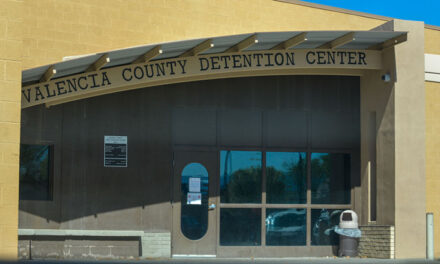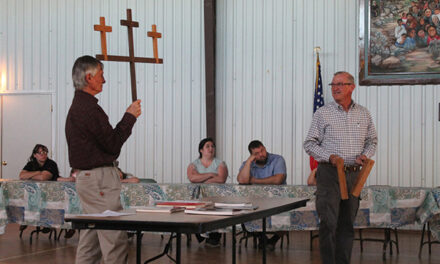It was a swing and a miss for the Valencia County commissioners in their latest attempt to move the long-awaited hospital project forward.
At the Aug. 7 meeting, Valencia County Manager Danny Monette informed commissioners that the request for proposal issued in April for a hospital/24-hour emergency health care facility had gotten no responses from providers.

County attorney Dave Pato said an RFP issued in April 2018 had resulted in a contract with Lovelace Health Services, but that agreement was terminated shortly after the contract award.
At odds were an inmate health care subsidy up to $950,000 in the 2018 procurement, which Lovelace argued it wasn’t obligated to pay, along with the determination by the county that the company was proposing to construct a facility that was not a hospital as defined by state regulations.
The proposal put out earlier this year eliminated the inmate subsidy and defined a hospital as having a minimum of three beds.
“This most recent solicitation was the bare-bone minimum — a 24/7 emergency room/hospital using the regulations of what defines a hospital,” Pato said. “There was no responses. So the county has $26 to $27 million in public funds with the challenge of spending that when no one is willing to offer services to meet those requirements.”
In 2006, voters approved an eight year, 2.75 mill levy (property tax) to operate and maintain a hospital/24-hour emergency room in Valencia County. The tax expired in 2015 and the money collected has been set aside in a separate account, waiting for the day a facility is built and it can be conveyed to a provider.
“In a workshop the commission can explore options. Are there partners for the project? Do you want to seek a change to the regulatory definition of what is a hospital?” the attorney asked. “Staff needs to get direction from the board and effectuate that.”
Commissioner Gerard Saiz asked if the workshop would be just amongst the commissioners or if it would include the legislative delegation.
Monette said initially the thought was to only include the commission.
“To let you determine what you are looking for,” the manager said. “If we had the workshop with the legislators, I’m not sure we’d know what we needed to ask from them.”
Pato said he envisioned the workshop without the legislators to allow the board to decide what route it wanted to take.
Saiz said he personally disagreed with the idea.
“I think questions will arise about what the legislative delegation can or cannot or are willing to do,” Saiz said. “I’d like to give them an idea of what we’re thinking from the beginning. If we approach them for help, and they’re not willing or able to do something, it would be nice to know up front so we know what path to take from the beginning.”
Commissioner Charles Eaton agreed with Saiz, saying the legislators would be the most critical component to anything happening in Santa Fe to help move the hospital project forward.
“They might not have answers that evening, but they can then go and research what they might be able to consider,” Eaton said. “We need to take advantage of them and their staff and engage them as early as possible.”
Saiz asked staff to provide as much detailed information about the project as possible to the county’s legislators in advance of the workshop. Pato said he would draft a memo outlining the two most recent procurement attempts, the regulatory language the county needed to comply with, the language in the 2006 mill levy referendum and any other facts that would be helpful.
An exact date for the workshop hasn’t been set, but Monette and the commissioners agreed to shoot for the week of Sept. 2, after the Labor Day weekend.
During public comment, Ann Jones, a Los Lunas resident and member of the Medical Care Advocates of Valencia County group, suggested the workshop be a time for both the public and legislators to weigh in on the project.
“You should also make sure someone is there who understands the regulations that members of the public don’t,” Jones said. “For instance, a recent micro hospital built in Albuquerque doesn’t accept Medicare or Medicaid. There are a lot of hospitals interested in being here that might not serve our county.”
Julia M. Dendinger began working at the VCNB in 2006. She covers Valencia County government, Belen Consolidated Schools and the village of Bosque Farms. She is a member of the Society of Professional Journalists Rio Grande chapter’s board of directors.

















